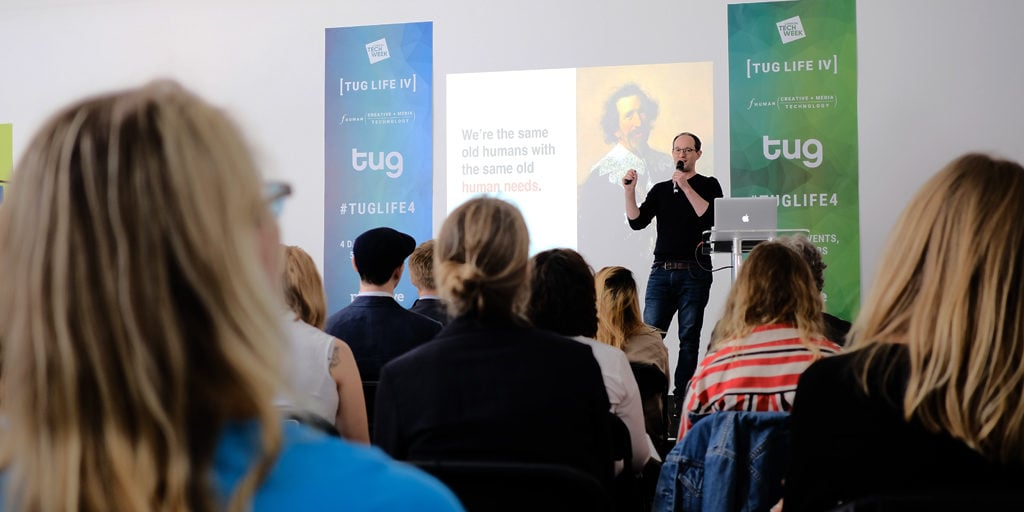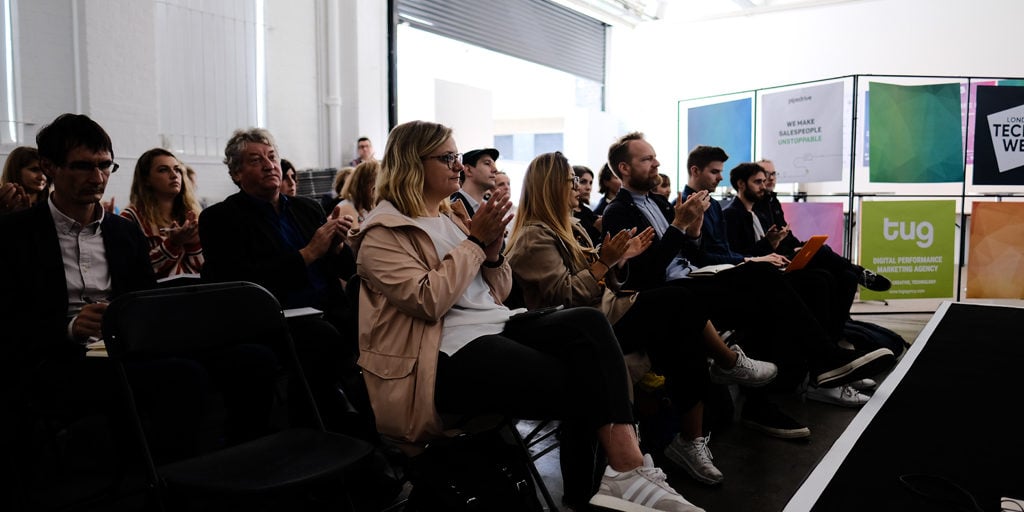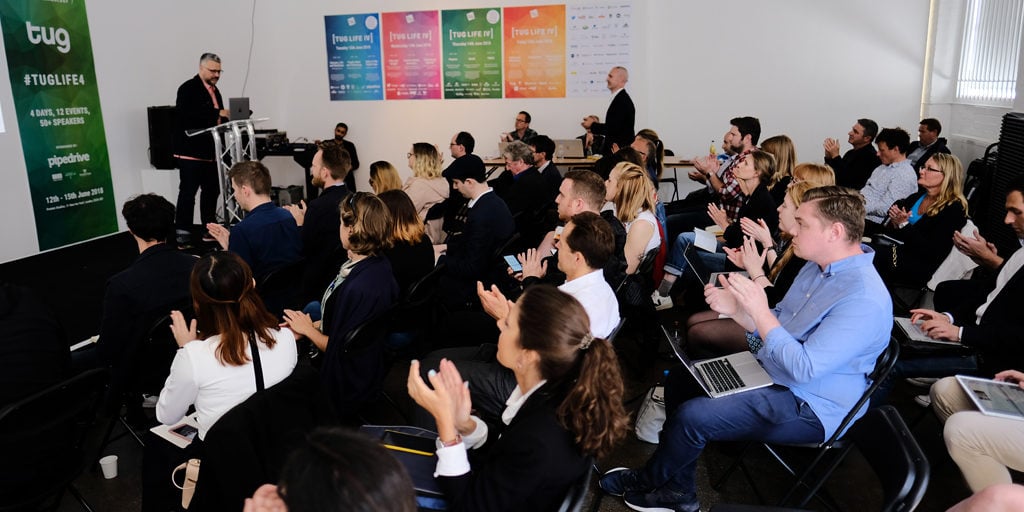Tech needs people, Millennials need financial help, and Fever Tree didn’t need digital – TugLife IV day three
It was true in retail, where InternetRetail’s Ian Jindal and TrendWatching’s David Mattin surveyed the ingenious, teched-up future of retail and concluded that only brilliant frontline people are likely to have the taste and human touch to satisfy today’s demanding consumers.
It was true in fintech, where speakers from Schroders, Lloyd, RBS and others showed that millennials, financial illiterates and more or less everyone else need smart technology – developed by humans who really listen and driven by AI – to help them weather incredibly challenging financial times. And as for the good people of fmcg, those that don’t need digital already certainly will soon.
Those millennials were the focus of Schroders global head of digital strategy and innovation Ed Lecky-Thompson, who made no bones about the financial crisis facing young people who lack cash, savings and realistic pension provision and are widely priced out of home ownership. One part of the solution, he said, is smarter, cheaper fintech products that educate and breed good habits.
“We are in a hell of a bad way, I’m not going to mince words,” said Lecky-Thompson. “But no-one is doing a great deal. There’s no-one giving you the opportunity to say, ‘I didn’t buy breakfast at Pret today, I want to put that money into my Sipp.’ Fintech is a huge opportunity for us to crack all these problems on one go, and if we don’t, the consequences are dire.”

Terry Cordeiro of the Applied Sciences Group at Lloyds explored the connection between financial illiteracy – which afflicts one in seven of us – and mental health, and suggested AI in the hands of banks can help.
“We can use machine learning and AI to predict when customers may get into financial difficulty, because we know what that person looks like,” said Cordeiro. “We know their behaviour, we can forecast, we can predict.”
Wincie Wong, digital propositions lead at RBS, freely conceded that big banks need to serve customers better if they are not to be disrupted by fintech start-ups, and presented innovations ranging from virtual visual avatars to receipts management technology for small businesses.
“If you build it for the customer, get into the customer’s mind and take them into the process, you’re more likely to build things they enjoy and like,” she said.
The challenges of innovating at scale in big companies were the focus of Conor Gunn, formerly a senior digital director at Barclays and British Gas, who concluded that digital transformation equals cultural transformation.
“I don’t understand why companies have digital strategies,” said Gunn. “They should have business strategies and digital should be around how do we accelerate, how do we amplify and expand and move faster?

Retail, too, needs to understand consumers better, and also note the value that human beings bring to the process, according to a second session that asked: does anyone actually enjoy shopping anymore?
“There will be retail brands that totally embrace augmented commerce, automate everything they do, have very few staff – that’s one route for a retail brand to take,” said Mattin, TrendWatching’s global head of trends and insights. “If you want to be a retail brand that delivers a more human experience that’s about feelings, human taste and sensibility and curation, you need to think about the human staff you need to do that.”
InternetRetail editor-in-chief Jindal described how companies such as Amazon have made excellence standard, turning consumers irrevocably into “ungrateful, nasty people who want everything yesterday”.
He noted that the only possible way to satisfy them is with a seamless fusion of technological efficiency and human empathy. “Brands have to behave like authentic, consistent human beings, because that’s what we are buying into, 24 hours a day, across all channels. And the switch in retailing is all about: how do we turn our people frontline people into superhumans?”
Pret A Manger marketing director Mark Palmer proved the point, outlining a marketing strategy that puts the in-store experience at the centre. “The most important part of our marketing team at Pret are the 12,000 people that work in Pret shops,” Palmer said, adding that Pret will never cross-sell further products or offer automatic checkouts. “If people wonder why people no longer enjoy shopping, they have to look at what it’s like for customers when they go into those shops,” he added.
Kieran McIlwain, head of product development at Three talked of turning around the mobile operator’s reputation, partly by using customer data to offer rewards and everyday assistance. “A brand is what a brand does,” he said. “Don’t stand there and tell me how great you are; go out and be great.”
Chris Hannigan, business development manager at yReceipts described the process of attributing in-store transactions to shoppers and campaigns, while Cooper Harris, CEO of impulse payments company Klickly, predicted a future of distributed commerce.

She lamented the $7.5tn of goods abandoned in online shopping carts last year, compared to $2.3tn sales completed, and said if retailers can reduce the purchase journey – for instance by embedding buy buttons in ads, as Klickly does – they can grab some of those aborted sales. “We believe that is the future of how people buy things in this world,” said Harris. “You will not go on a journey as a consumer, the brand will come to you.”
In the afternoon’s FMCG/CPG session, the National Lottery’s Richard Bateson wrestled with similar problems, predicting a major coming shift for bricks-and-mortar retail and detailing Camelot’s efforts to keep its £5.5bn of offline sales – 75% of its total – within its ecosystem.
“Admittedly, you can’t download a Mars bar; you can’t download milk,” he said, but added that fmcg brands will need to figure out how to tap into new digital distribution models. “You can argue one way or the other about whether digital impacts fmcg brands today, but it will definitely impact them in the future.”
Fever Tree’s Vince Lawson demonstrated that you don’t necessarily need digital to build a global brand, describing a process of seducing influencers from bartenders to chefs. He revealed that the premium mixer brand is now ten times larger than its nearest competitor and sold enough bottles and cans last year to wrap around the world twice.
Tash Perros of food supply platform FoodChain talked about building its network to connect small suppliers of fresh produce with chefs and restaurants. Cost efficiencies unlocked by the company’s app-driven system keep prices low without squeezing suppliers, she said. “We have several suppliers we work with who have just cut out their sales function because we give them so many leads.”
Gareth Turner, senior global brand manager at €200bn Danish cooperative Arla Foods, whose brands include Arla, Anchor and Lurpak, offered a polemic against the suggestion that digital alone is a strategy and advised a return to old-fashioned media sense, strong consumer insights, scale, integrity and quality creativity. “Digital is not a f***ing strategy,” he said. “It’s just a media channel. Digital is only a potential solution to a problem. It is not a strategy in itself.”


